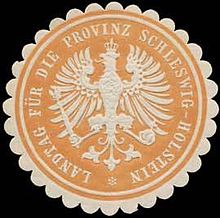Schleswig-Holstein Provincial Parliament
The Provincial Landtag Schleswig-Holstein was a self-governing body within the Provincial Association in the Province of Schleswig-Holstein , which existed after the German War from 1868 until its dissolution on January 1, 1934.
history
After the end of the German-Danish War there had been conflicts between the Kingdom of Prussia and the Empire of Austria over the administration of the former duchies of Schleswig and Holstein . As a result of the German War and the Peace of Prague , the Prussian province of Schleswig-Holstein was founded. The United Schleswig-Holstein Provincial Parliament - its official name - was constituted for the first time on October 11, 1868 in Rendsburg . It was composed of nineteen representatives each from the large estates, the cities and the rural communities. Only a few voters were able to exert an influence on this state-class composition. Basically, its constitution followed the Prussian provincial parliaments . In the main, the state parliament took on self-administration tasks for the province of Schleswig-Holstein ( called provincial association in this function ). These included road construction , welfare , insurance and medical services, as well as art and science.
In the Duchy of Saxony-Lauenburg , which was not attached until July 1, 1876 (incorporated into Prussia as the District of Duchy of Lauenburg ), there was parliament for the Lauenburg Regional Association founded in 1872 . The territory and tasks of the regional association existed until 1945. The responsibility of the regional association Schleswig-Holstein extended to the rest of the provincial area.
In 1871 a standing committee was set up as an administrative body. From 1875 the members of the provincial parish were elected by the district parishes and city council assemblies . Until 1890, the provincial parliament did not have a self-elected chairman, but a land marshal appointed by the king . After that, the committee could elect a chairman itself.
After the First World War , during the Weimar Republic, the members of the Provincial Parliament were elected in free, secret and equal elections by the eligible population of Schleswig-Holstein ( results ). In January 1926, direct elections to the Provincial Parliament of Schleswig-Holstein were held for the first time in Lauenburg (catching up for the provincial elections on November 29, 1925), so that the Lauenburgers have since sent directly elected representatives to the Lauenburg Municipal and Schleswig-Holstein Provincial Parliament. In the Third Reich , the provincial parliament (like the communal parliament) lost its function from 1933 onwards in the course of state centralization: It was dissolved on January 1, 1934.
The provincial parliament did not have its own house: until 1904, the meetings took place in Rendsburg and in the Schleswig State Hall. The committee met in Kiel from 1905 .
On February 26, 1946, the Appointed Landtag , which the British military government had put together, met for its first session in the provisional city theater at 103 Holtenauer Strasse in Kiel. Since May 1946, this body has been called the Provincial Parliament, based on the former Schleswig-Holstein Provincial Parliament. At the beginning of the 9th session on September 10, 1946, the announcement was made that with Ordinance No. 46 of the British Military Government of August 23, 1946, “Concerning the dissolution of the provinces of the former country of Prussia in the British zone and their re-establishment as independent Länder “ the province will be converted into the state of Schleswig-Holstein: the Schleswig-Holstein Landtag was created from the provincial parliament .
Personalities
Prussian State Council
The Provincial Parliament of the Province of Schleswig-Holstein elected three members of the Prussian State Council in the Weimar Republic . These goods:
| No. | MP | Political party | Term of office | Representative | Political party | Term of office |
|---|---|---|---|---|---|---|
| 1 | Hermann Todsen | AG | May 1921 to January 1930 | Ludwig Ahlmann | AG | May 1921 to January 1930 |
| 1 | Max Brewer | SPD | January 1930 to April 1933 | Willi Verdieck | SPD | January 1930 to April 1933 |
| 1 | Otto Hamkens | NSDAP | April to July 10, 1933 | Oskar Kahle | NSDAP | April to July 10, 1933 |
| 2 | Count Christian zu Rantzau-Rastorff | AG | May 1921 to January 1930 | Nicolai Shipowner | AG | May 1921 to January 1930 |
| 2 | Wilhelm Struve | DDP | January 1930 to April 1933 | Richard Hansen | SPD | January 1930 to April 1933 |
| 2 | Claus Petersen | NSDAP | April to July 10, 1933 | Otto Hamkens | NSDAP | April to July 10, 1933 |
| 3 | Wilhelm Spiegel | SPD | May 1921 to December 27, 1922 | Max Brewer | SPD | May 1921 to January 18, 1923 |
| 3 | Max Brewer | SPD | January 18, 1923 to January 1930 |
Gustav Niendorf Willi Verdieck |
VSPD SPD |
January 16, 1923 to February 1926 , February 1926 to January 1930 |
| 3 | Count Christian zu Rantzau-Rastorff | AG | January 1930 to April 1933 | Hermann Todsen | AG | January 1930 to April 1933 |
| 3 | Paul Schneider | NSDAP | April to July 10, 1933 | Count Alexander von Kielmansegg | Battle front | April to July 10, 1933 |
See also
- Administrative division of Prussia
- Category: Member of the Provincial Parliament of Schleswig-Holstein
Web links
Individual evidence
- ↑ Klaus-Joachim Lorenzen-Schmidt a . Ortwin Pelc (Ed.): Schleswig-Holstein Lexicon . Wachholtz, Neumünster 2006, Lemma Provinziallandtag.
- ↑ Klaus-Joachim Lorenzen-Schmidt a. Ortwin Pelc (Ed.): Schleswig-Holstein Lexicon . Wachholtz, Neumünster 2006, Lemma Landtag.
- ^ Joachim Lilla : The Prussian State Council 1921-1933. A biographical manual. With a documentation of the State Councilors appointed in the “Third Reich” (= manuals on the history of parliamentarism and political parties. Volume 13). Droste, Düsseldorf 2005, ISBN 3-7700-5271-4 , p. 276.

